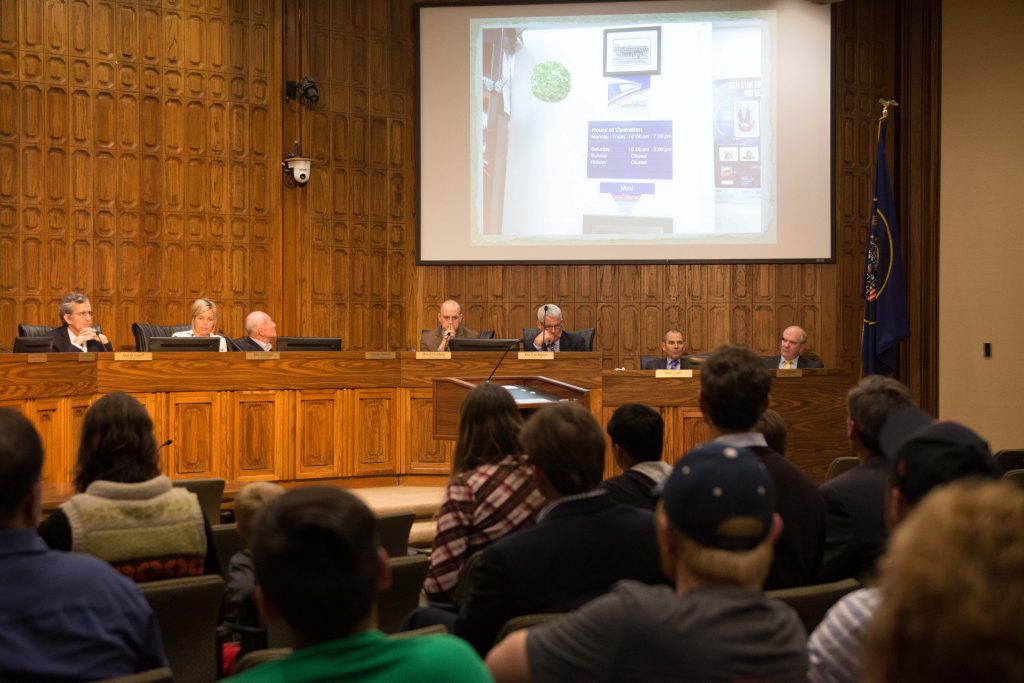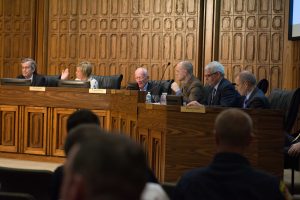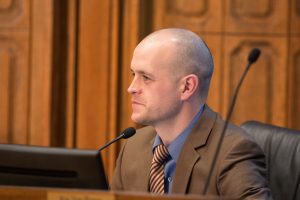
The hype and intensity of national elections has settled down and students may be putting their political engagement on the shelf for the next four years.
But whether horrified at the recent election outcomes or hopeful for America’s future, students can look to their neighborhoods and cities for ways to get involved politically even when it’s not an election year.
Orem City’s youngest city council member, Sam Lentz, 32, said citizens can have a greater influence on local government than on national government.
“The things that impact your daily life the most, a lot of that happens at the local government with the city council and volunteer citizen commissions,” Lentz said. “That’s really where the rubber meets the road.”
Lentz first saw the strong connection with local government decisions and his daily life after he had children and bought a home. He said he feels he has the most say at a local level compared to a federal level.
“I want to be a part of this conversation so that I can help shape the future for my family, for my children, get involved in the schools,” Lentz said. “It’s been a lot of fun.”
Alexander Barton is a master’s student at the University of Utah studying City and Metro Planning and was the vice chair for the Joaquin Neighborhood from Nov. 2015 to May 2016. He became involved in local government when he realized his influence could help the area function better for current and future students.
“Neighbors work best when people of all different groups are working together,” Barton said.
It’s important for students not to isolate themselves on campus, Barton said, but instead get out in the community and get involved in local projects.
Barton said he worries after the intensity of recent presidential elections, students will become disillusioned with their influence in government.
“You don’t have to do it just once every four years,” he said. “It’s really a lot more effective if you’re looking for opportunities in the community, because they’re all around.”
Barton suggests students look into Provo City’s website or the website of the city they live in. He said Provo City’s social media is a great place for students to get involved.
Barton said government includes more than sitting through city council meetings. Students can volunteer to help with the monthly Rooftop Concerts, local 5Ks and 10Ks and other opportunities in the community.
“If you have a subject that you’re passionate about — something you’re interested in — a lot of times that will be coordinated at a city level,” Barton said. “I think you can learn things that way that you don’t learn just in a classroom.”

BYU urban and regional planning senior Brittney Harris is doing a capstone project creating a neighborhood plan for Orem City.
Harris, who is also the president of BYU’s Student Urban Planning Association said she definitely wants to continue to be involved in the community throughout her life.
Although she is undecided if she would want to run for office, Harris said she definitely plans to attend city council and planning commission meetings to give her opinion and make people aware of community issues.
“I never realized before how much you can get involved in that way and what a big impact you can have if you get involved (locally) versus national politics — you don’t really have a huge impact,” Harris said.
Harris said there are endless options for students to get involved in community development, even if they may not have a lot of spare time.
Students can attend monthly neighborhood meetings (especially the Joaquin Neighborhood meetings), planning commission meetings or city council meetings to give their voice on new developments in the area, zoning restrictions, parking and other issues affecting them. If students can’t attend these meetings in person, many meetings are streamed online and the agendas and minutes are posted after each meeting.
“It’s sad that the younger people aren’t having their voices heard,” Harris said.
Harris said almost all attendees of these meetings are above age 50 and they often have different ideas than many of the students who highly populate the Provo area. The older people often want the same things the community has always had, where students tend to want more walkable space or a more environmentally friendly community, Harris said.
“Just coming together as a neighborhood too and figuring out what you want together and creating community by being involved is huge,” Harris said.
Harris also said students are welcome to take urban planning intro classes where they will learn about how local government works or look into the civic engagement minor.
“It’s a burden to be involved until it’s something that you’re really passionate about,” Harris said.
Provo’s youngest city council member, David Harding, 38, said two years ago he would never have believed it if someone told him he’d be a member of the city council. But after getting involved in his neighborhood meetings, he found community involvement to be so important he chose to “step up and do it.”
On top of his full-time job as an engineer for a biomedical startup, raising four children with his wife and serving in LDS Church positions, Harding spends anywhere from 16-20 hours per week serving on the Provo city council.

“(When) people are willing to volunteer there’s more than enough opportunities for anyone who wants to be involved,” Harding said.
Harding said he can’t stand politics, but he believes public service is important and being involved in the community is important. He encourages students to pay attention to what is going on in their communities.
“As you serve the community you’ll grow your talents and you’ll grow your capabilities. And then throughout your life opportunities will arise, but we need everyone’s energy,” Harding said. “It really helps our neighborhoods when everyone is willing to get involved.”
Catherine Cooper, associate director at the Romney Institute of Public Management, said BYU students who get involved in local government can be a “breath of fresh air” in their cities.
One great way students can become more informed is to follow the issues from the cities they live in, their hometowns, cities they want to live in and any other cities they’re interested in. Cooper also said students should familiarize themselves with the U.S. Constitution by reading it or taking a class about it.
“Be informed. That’s the number one thing,” Cooper said.
Government is becoming increasingly accessible through the internet, according to Cooper. Many cities have apps for citizens to take photos of cracked sidewalks, fallen trees, potholes, etc., and submit them through the app so problems in the community can be fixed. Cooper said city officials love that input and students can easily share it.
Students who get involved in local government will also have an increased quality of life, according to Cooper.
“Every undergraduate degree person — if they’re searching for a leadership management degree in the public sector — there’s a need for them somewhere,” Cooper said. “There’s so much to do to make a difference.”




